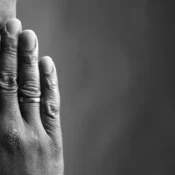Playlist for Loss, Grief & Bereavement
When my husband died 3.5 years ago, I became a widow at 31 years old. I found life tasteless. I didn’t find joy in anything, I left all forms of social media and couldnt consume any content. It felt like everything was pointless. Minutes turned into hours and then days, I was in survival mode, I had just about enough energy for the day and wanted to lock myself away in a bubble.
As cosy as my bubble may sound, it may have come to your mind that the cocoon I was living in, couldn’t last forever. And sure enough it didn’t. I had to begin to face the world again and it felt scary. I felt like no one understood me.
Inability to move forward of feeling stuck
In church I looked around and saw ‘happy clappy christians’ that everything was going ‘well’ for. I saw my friends enjoying their full families. “Must be nice,” I thought to myself. Among my family people were able to move forward and begin living, my friends would have stories to share of experiences they’ve had, but I couldn’t resonate, I felt alone.
I was a shadow of my former self, simply just existing. I would think to myself ‘there is nothing more in life for me’ apart of course from seeing my children grow up and if God will have it, my grandchildren too. I would shake my head at myself thinking, gosh i had so much potential. This would spiral me into further sadness and I would cry and cry and then accept my ‘fate’.
I felt alone and stuck but I didn’t know how to unstick myself (or maybe I didn’t want to). But I knew I needed to, but I just couldn’t figure out how. The fact that I felt so sad about this surely meant I believed there was something in the core of me that did not want to accept the circumstances that I was in.
Pivotal moment for me was when my son began to cry on his 9th birthday. I was confused as I thought he was crying because he missed his dad, but on further exploration he was crying because he missed me.

He wanted his mum back, he wanted me to be happy and available. This moved me to tears but again I couldn’t do anything for another 3- 4 months. As mentioned I was stuck. For context let’s define what ‘stuck’ meant to me. It was the ‘inability to move from a particular position or place, or being unable to change a situation’.
Essentially, I was trapped in my grief narrative,I needed to feel alive again, feel like I was living for purpose. I decided I needed to re enter life again. I was traumatised and the pain felt so heavy that I would never be the same or even better. I couldn’t see past my own situation.
I began listening to stories of those who had struggled with grief and had come out the other side resilient – which means they had the capacity to recover from challenging situations and this set a spark within me.
I thought if this happened to this person and they survived then surely I could. Listening to these stories sounded like ‘quick maths’ to me i.e 1+1 = 2.
How does storytelling help trauma in grief?
I began listening to stories from my family, friends, friends of friends, online via ted talks, podcasts and influencers, and anyone that was willing to share their authentic story about grief. It helped me to feel connected to something and less alone. Stories were such a huge part of my re entry journey to life, just hearing someone with a story that I can resonate with soothed the ache in my heart.
It may sound like a taboo when they say let your feelings out, but hearing others express them, acknowledge them and invite them out to share with me was powerful.
It was then, that I realised how healing storytelling can be.
Hearing another person’s story offers the opportunity to connect on an emotional level. Often when grieving we want to minimise our pain and therefore try to internalise all our pain or ‘be strong’. However, when a person shares their story, it opens you to vulnerability and emotional connection.
You may have looked at them on the surface and may not immediately note the value that they have to share. That’s what I did and how I felt about those around me in the early days. It felt like everyone’s life was ‘perfect’ except mine, but when I really stopped to listen I realised that most people over a certain age have navigated through some of the feelings I was experiencing and I could therefore connect with them.
Imagine if I hadn’t stopped to listen, or was so engulfed in my own grief that I magnified my experience over others.
Just listening to others stories made me realise that we all have one struggle or another in life, but I also found it encouraging that it is possible to overcome. Quick maths.

Why does telling your story matter?
How do you feel after watching a movie or a ted talk where the main character overcomes challenges, and gets their happy ending? It leaves you with a good feeling. When we share our stories it’s healing in that way too, although it may be heavy, someone will find comfort in your strength as you share. We share not only to benefit others, but to also benefit yourself. It is actually good for your emotional health to tell and retell your story.
‘Research has found that openly sharing one’s story verbally has a cathartic or purging effect that alleviates psychological distress. Similarly, writing about traumatic experiences and illnesses often helps to decrease symptoms.” Amazing Ways Personal Storytelling Helps Heal Grief
For me in the earliest stage, I was not ready to share my story, but found succour in the story of others as mentioned. Sometimes I would listen to the stories over and over again. Sometimes I would cry most of the way through but I kept listening until I was brave enough to share my own story. You can listen to my story or listen to me navigate storytelling with the guests on my Podcasts – In Every Season.
On the days when words or stories were too heavy to consume, I listened to music. In a previous post, we have shared how music can impact the grieving process. So I won’t delve into that too much today.
But I have shared a playlist with some songs, I hope you find them helpful.
Sharing my own story brought out a deeper healing each time I shared it. I saw how it encouraged others and that also gave me hope that a good future awaits me. If you are thinking about sharing your story with us, we would love to hear from you.
With this I also want you to experience the healing from storytelling, I have received while you are grieving. Therefore, I have put together a playlist of encouraging talks, messages and music you can listen to in order to help you navigate to the other side of your loss and heartbreak.
Playlist for those dealing with grief, loss, and bereavement
Loss, grief, and bereavement music playlist
Getting Support
Balanced Wheel’s Bereavement support groups support anyone who has lost a parent, spouse/partner, child, grandparent, grandchild, sibling/relative, or friend.
Grieving is a highly personal experience. Losing a loved one is a painful experience. Support is available if you have lost someone close to you. Support is available from Balanced Wheel.
You can eventually cope with your loss by getting the proper support. Sharing your experience of grief with others who are experiencing similar things can be more helpful than trying to cope alone.
So, I invite you to join Balanced Wheel’s peer-to-peer bereavement support group.
Would you please complete this registration form for any of the next two bereavement support groups? I would also like you to forward it to someone who could benefit from a bereavement support group.
I’d love to share your coping with grief story too.
We would love to hear about how you handled grief, which music, article or video helped you. Would you please let me know if you would like to share your story?
I am also open to having anyone anonymised if that’s your preferred option. Complete the contact us form with the text “I would like to share my story.”
We would like to hear from you. Would you please share your thoughts, comments and reflections below? Thank you.

Abimbola is passionate about working with families to build resilience. She founded In Every Season, which aims to provide resources for those navigating through life’s various challenging seasons and help them sustain a healthy family dynamic. She also authored My Sisters Are Not Good At Wrestling, a children’s picture book on grief that will provide comfort and hope for children and adults.
Author
One thought on “Playlist for Loss, Grief & Bereavement”
Add a Comment
Recent Posts
Grief and Mental Health – Round Post
Collective Grief – Round Post
Getting Over The Death Of A Loved One
Your Story
Matters
info@balancedwheel.co.uk



[…] Music Playlist For Loss, Grief & Bereavement […]